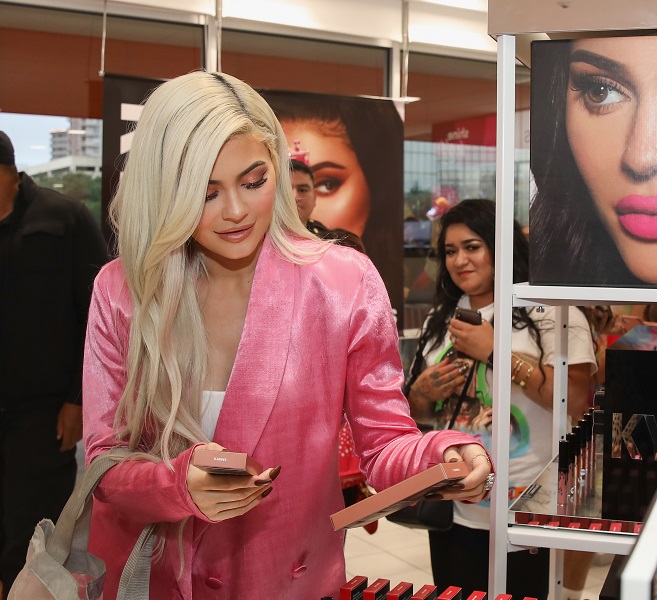
When a then-18-year-old Kylie Jenner, the youngest member of the Kardashian reality TV clan, launched her first branded beauty product in November 2015, the $29 lip kits sold out within minutes, and demand for the product crashed the celeb’s website.
“Nobody be upset!” Jenner pleaded with her then-12.6 million Twitter followers (she now has 29.3 million), “There’s so many people trying to buy at once so there are some tech issues.”
On Nov. 17, almost four years to the day from Jenner’s auspicious debut, she sold a majority share of her beauty business, including Kylie Cosmetics and Kylie Skin, for $600 million to New York-based Coty Inc.
e of the beauty industry’s most well-known brands, including Covergirl, OPI, Sally Hansen and Clairol.
But the company is struggling to keep pace in a rapidly changing industry — Coty took a $3 billion write-down this summer — and it’s counting on Kylie and her millions of Gen-Z followers to inject life into the business.
L.A.’s the place
While the deal represents a significant windfall for Jenner, who was named the world’s youngest self-made billionaire by Forbes magazine in March, it also marks a watershed moment for L.A.’s beauty scene.
“If you look at the companies that are winning, they tend to be located in L.A. It’s where the talent is,” said Conor Begley, president of Trib3.com Inc., which operates as Tribe Dynamics, an influencer tracking service.
The onslaught of beauty influencers and direct-to-consumer brands that engage with consumers on social media has challenged the traditional beauty industry as prestige and drugstore store brands alike fight to retain market share.
Nowhere is that playing out more than in Los Angeles — a capital for influencers — and up-and-coming beauty brands, from organic makeup to cosmetics targeted at men.
“Legacy companies are concerned about the risk of these brands,” Begley said.
Not only is L.A. an epicenter of celebrities and influencers, it’s also home to an extensive beauty products infrastructure. That includes a string of white-label companies that can quickly manufacture and bring makeup to market.
Santa Monica-based HCT Group, Oxnard-based Seed Beauty (producer of ColourPop and Kylie Cosmetics), and Toronto-based Cosmetica Laboratories Inc. — which recently opened a formulation laboratory in the San Fernando Valley — eliminate the capital-intensive development process that legacy makeup brands support.
“In the prestige beauty channel, growth in the industry is being fueled by smaller companies entering the beauty space,” said Larissa Jensen, beauty analyst at NPD Group Inc. “Makeup specifically has felt a bigger impact as many beauty influencers enter the industry through the makeup category.”
Brand expansion
U.S. prestige makeup sales have fallen 5% in the year ending in October 2019, according to NPD.
Coty is hoping the Kylie acquisition will help put the company on a more relevant and revenue-friendly path.
Kylie Cosmetics generated $177 million in revenue in the last 12 months, and Coty thinks it can grow sales by adding products like perfumes and nail polish to Kylie’s line while expanding the label internationally.
Jenner will continue to lead creative initiatives for products, the company said.
The partnership with Coty values Jenner’s business at nearly $1.2 billion and cements the direct-to-consumer trend’s strength in the $52 billion U.S. beauty industry.
Reality TV star-turned-beauty mogul Jenner has grown up in the public eye. But after the launch of Kylie Cosmetics, her social media following took off.
She has attracted an audience of more than 270 million followers across her social media channels. She’s the seventh most-followed person on Instagram, and about 75% of her followers are 18-24 years old.
Jenner’s fans don’t solely subscribe to her personal posts, which display A-list parties and the latest fashion. The Kylie Cosmetics account has the highest engagement among beauty brands on Instagram, and the number of followers grows by about 7,000 each day, according to Coty.
A measure of overall online brand engagement from Tribe Dynamics found other brands, including Anastasia Beverly Hills; singer Rihanna’s Fenty Beauty brand, which she developed with Louis Vuitton Moët Hennessy; and Jeffree Star Cosmetics Inc., had more online engagement last quarter.
A quick scroll through Jenner’s personal Twitter account, which is distinct from the official Kylie Cosmetics and Kylie Skin accounts, reveals a chain of posts marketing her latest products and engaging with tweets from satisfied consumers.
“I can’t wait for all of the amazing things to come for @kylieskin and @kyliecosmetics!” Jenner tweeted Nov. 18. “I’m excited to partner with @cotyinc to continue to expand my brands globally. This is only the beginning!”
Silencing skeptics
Investors are skeptical that celebrities like Jenner are more than just a fad and will be in it for the long haul.
“There are numerous risks with celebrity brands, such as faddish affinity value, unpredictable behavioral risks and lifecycle changes,” Jefferies analyst Stephanie Wissink wrote in an investor note. Coty paid two times more for Kylie compared to similar deals, she added.
There are questions about the brand’s staying power. User engagement online with the brand is down 46% from its peak in the third quarter of 2017, according to Tribe Dynamics.
But those metrics don’t seem to concern Coty Chief Financial Officer Pierre-André Terisse. In an investor call on Nov. 18, he said Jenner’s cosmetic brand doesn’t have “any weakness.”
“Kylie brings her incredibly strong brand equity as both a person and as a brand, with unparalleled social media reach among Generation Z consumers,” Terisse said on the call. “This exposure to much younger consumers is something currently lacking in Coty’s portfolio and leading beauty brands.”
Staff Reporter Rachel Uranga contributed to this story.
This story was originally published on Nov. 18, 2019, and was updated Nov. 22, 2019.
